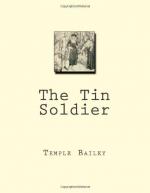“Breakfast.”
“Yes. An’ we had puffed rice and prunes—”
Nurse, coming up, was immediately on the job. “You are getting mud on Mr. Derry’s spats, Teddy. Stand up like a little gentleman.”
“He is always that, Nurse, isn’t he? And I should not have on spats at this hour in the morning.”
Derry smiled to himself as he left them. He knew that Nurse did not approve of him. He had a way as it were of aiding and abetting Teddy.
But as he went on the smile faded. There were many soldiers on the street, many uniforms, flags of many nations draping doorways where were housed the men from across the sea who were working shoulder to shoulder with America for the winning of the war—. Washington had taken on a new aspect. It had a waked-up look, as if its lazy days were over, and there were real things to do.
The big church at the triangle showed a Red Cross banner. Within women were making bandages, knitting sweaters and socks, sewing up the long seams of shirts and pajamas. A few years ago they had worshipped a Christ among the lilies. They saw him now on the battlefield, crucified again in the cause of humanity.
It seemed to Derry that even the civilians walked with something of a martial stride. Men, who for years had felt their strength sapped by the monotony of Government service, were revived by the winds of patriotism which swept from the four corners of the earth. Women who had lost youth and looks in the treadmill of Departmental life held up their heads as if their eyes beheld a new vision.
Street cars were crowded, things were at sixes and sevens; red tape was loose where it should have been tight and tight where it should have been loose. Little men with the rank of officer sat in swivel chairs and tried to direct big things; big men, without rank, were tied to the trivial. Many, many things were wrong, and many, many things were right, as it is always when war comes upon a people unprepared.
And in the midst of all this clash and crash and movement and achievement, Derry was walking to a toy shop to carry a tea-cup!
He found Miss Emily alone in the big front room.
She did not at once recognize him.
“You remember I was in here the other night—and you wouldn’t sell—tin soldiers—.”
She flushed a little. “Oh, with your father?”
“Yes. He’s a dear old chap—.”
It was the best apology he could make, and she loved him for it.
He brought out the cup and set it on the counter. “It is like yours?”
“Yes.” But she did not want to take it.
“Please. I brought it on purpose. We have a dozen.”
“Of these?”
“Yes.”
“But it will break your set.”
“We have oodles of sets. Dad collects—you know— There are dishes enough in the house to start a crockery shop.”




